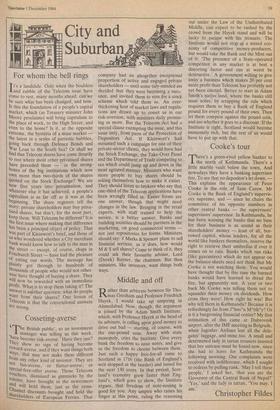Cosseting-averse
The British public', so an investment manager was telling us this week, `have become risk-averse.' Have they just? They show no sign of having become reward-averse, and if they want things both ways, that may not make them different from any other kind of investor. They are not fun-averse, or flutter-averse, or special-free-offer averse. Those Telecom vouchers, dismissed as gimmicks by the solemn, have brought in the newcomers and will hold them, just as the cross- Channel discounts brought and held the Shareholders of European Ferries. That company had an altogether exceptional proportion of active and engaged private shareholders — until some tidy-minded ass decided that they were becoming a nuis- ance, and invited them to vote for a stock scheme which told them so. An ever- thickening host of market laws and regula- tions are drawn up to cosset us in our risk-aversion, with ministers daily promis- ing us more. But the Telecom Act had a special clause exempting the issue, and this issue only, from parts of the Protection of Depositors Act. If Kleinwort's had mounted such a campaign for one of their private-sector clients, they would have had the Stock Exchange, the Take-Over Panel and the Department of Trade competing to see which could jump up and down in the most agitated manner. Ministers who want more people to buy shares should be asking themselves how to make it easier. They should listen to brokers who say that one-third of the Telecom applications have been wrongly filled in. Easier forms are one answer, though that might need changes in the law. Bringing in the retail experts, with staff trained to help the novice, is a better answer. Banks and building societies should be partners in the marketing, on good commercial terms not just repositories for forms. Ministers should, say: if Marks & Spencer plans to sell financial services, as it does, how would M & S sell shares? Come to think of it, they could ask their favourite adviser, Lord (Derek) Rayner, the chairman. But then ministers, like investors, want things both ways.






















































 Previous page
Previous page